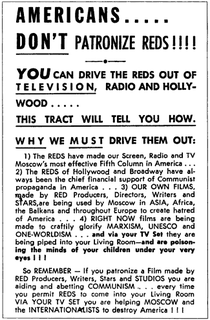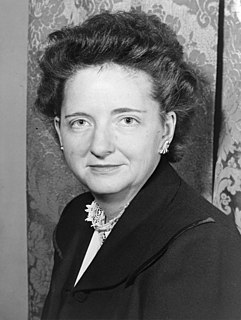Related Research Articles

McCarthyism is the practice of making accusations of subversion and treason, especially when related to communism and socialism. The term originally referred to the controversial practices and policies of U.S. Senator Joseph McCarthy (R-Wisconsin), and has its origins in the period in the United States known as the Second Red Scare, lasting from the late 1940s through the 1950s. It was characterized by heightened political repression and persecution of left-wing individuals, and a campaign spreading fear of alleged communist and socialist influence on American institutions and of espionage by Soviet agents. After the mid-1950s, McCarthyism began to decline, mainly due to Joseph McCarthy's gradual loss of public popularity and credibility after several of his accusations were found to be false, and sustained opposition from the U.S. Supreme Court led by Chief Justice Earl Warren on human rights grounds. The Warren Court made a series of rulings on civil and political rights that overturned several key laws and legislative directives, and helped bring an end to the Second Red Scare. Historians have suggested since the 1980s that as McCarthy's involvement was less central than that of others, a different and more accurate term should be used instead that more accurately conveys the breadth of the phenomenon, and that the term McCarthyism is now outdated. Ellen Schrecker has suggested that Hooverism after FBI Head J. Edgar Hoover is more appropriate. Others, including Stanley Kutler, have instead suggested the term McCarranism after Senator Pat McCarran of Nevada, a key legislative figure in the movement.
A Red Scare is the promotion of a widespread fear of a potential rise of communism, anarchism or other leftist ideologies by a society or state. It is often characterized as political propaganda. The term is most often used to refer to two periods in the history of the United States which are referred to by this name. The First Red Scare, which occurred immediately after World War I, revolved around a perceived threat from the American labor movement, anarchist revolution, and political radicalism. The Second Red Scare, which occurred immediately after World War II, was preoccupied with the perception that national or foreign communists were infiltrating or subverting U.S. society and the federal government. The name refers to the red flag as a common symbol of communism.

I Was a Communist for the FBI is a 1951 American film noir crime film directed by Gordon Douglas and starring Frank Lovejoy. The film was produced by Bryan Foy who was head of Warners B picture unit until 1942.
The American League Against War and Fascism was an organization formed in 1933 by the Communist Party USA and pacifists united by their concern as Nazism and Fascism rose in Europe. In 1937 the name of the group was changed to the American League for Peace and Democracy. Rev. Dr. Harry F. Ward headed the organization.

Elizabeth Terrill Bentley was an American spy and member of the Communist Party USA (CPUSA). She served the Soviet Union from 1938 to 1945 until she defected from the Communist Party and Soviet intelligence by contacting the Federal Bureau of Investigation (FBI) and admitting her own activities.
Matthew Cvetic was a Pittsburgh native who was a spy and informant working for the Federal Bureau of Investigation inside the Communist Party of the United States (CPUSA) during the 1940s. He told his story in a series in the Saturday Evening Post, and his experiences were then fictionalized in the old time radio show I Was a Communist for the FBI, adapted for a Warner Brothers motion picture in 1951. He testified before the House Un-American Activities Committee in the 1950s.

President Harry S. Truman signed United States Executive Order 9835, sometimes known as the "Loyalty Order", on March 21, 1947. The order established the first general loyalty program in the United States, designed to root out communist influence in the U.S. federal government. Truman aimed to rally public opinion behind his Cold War policies with investigations conducted under its authority. He also hoped to quiet right-wing critics who accused Democrats of being soft on communism. At the same time, he advised the Loyalty Review Board to limit the role of the Federal Bureau of Investigation (FBI) to avoid a witch hunt. The program investigated over 3 million government employees, just over 300 of whom were dismissed as security risks.
Anti-communism is political and ideological opposition to communism. Organized anti-communism developed after the 1917 October Revolution in Russia and it reached global dimensions during the Cold War, when the United States and the Soviet Union engaged in an intense rivalry. Anti-communism has been an element of movements which hold many different political positions, including conservatism, fascism, liberalism, nationalism, social democracy, libertarianism, and the Anti-Stalinist left. Anti-communism has also been expressed in philosophy, by several religious groups, and in literature. Some well-known proponents of anti-communism claim to be former communists. Anti-communism has also been prominent among movements resisting communist governance.

The House Committee on Un-American Activities (HCUA), popularly dubbed the House Un-American Activities Committee (HUAC), was an investigative committee of the United States House of Representatives, created in 1938 to investigate alleged disloyalty and subversive activities on the part of private citizens, public employees, and those organizations suspected of having either fascist or communist ties. It became a standing (permanent) committee in 1945, and from 1969 onwards it was known as the House Committee on Internal Security. When the House abolished the committee in 1975, its functions were transferred to the House Judiciary Committee.
Historians of American Communism (HOAC) is a national academic association, established in 1982, bringing together historians, political scientists, and independent scholars interested in the study of the Communist Party of the United States of America (CPUSA) and other communist and anti-communist organizations in the United States. The society publishes a semi-annual journal, American Communist History, produced by the British academic publisher Routledge. The organization also maintains an internet newsgroup on H-Net.

The Smith Act trials of Communist Party leaders in New York City from 1949 to 1958 were the result of US federal government prosecutions in the postwar period and during the Cold War between the Soviet Union and the United States. Leaders of the Communist Party of the United States (CPUSA) were accused of violating the Smith Act, a statute that prohibited advocating violent overthrow of the government. The defendants argued that they advocated a peaceful transition to socialism, and that the First Amendment's guarantee of freedom of speech and of association protected their membership in a political party. Appeals from these trials reached the US Supreme Court, which ruled on issues in Dennis v. United States (1951) and Yates v. United States (1957).

The Unemployed Councils of the USA (UC) was a mass organization of the Communist Party, USA established in 1930 in an effort to organize and mobilize unemployed workers to advance party policy goals in preparation for an anticipated final conflict to overthrow capitalism.

Daniel Joseph Leab was an American historian of 20th-century history, who made significant academic contributions to fields of American labor unions and anti-Communism. He was long-time editor of three journals and magazines.
Frederick Woltman was a 20th-century American newspaper journalist for the New York World-Telegram, known as "an anti-communist reporter in the 1940s and early 1950s, best known for criticism of U.S. Senator Joseph McCarthy in a series of articles called "The McCarthy Balance Sheet", which ran July 12–16, 1954.

Counterattack was a weekly subscription-based, anti-communist, mimeographed newsletter, which ran from 1947 to 1955 and was published by a "private, independent organization" of the same name and started by three ex-Federal Bureau of Investigation agents.

William Albertson was a 20th-century American leader in the Communist Party of the USA who battled federal and state courts, and who in 1964 was framed by the Federal Bureau of Investigation, which was only discovered posthumously in 1975. His widow made an out-of-court settlement in 1989 with the U.S. Government for $170,000.
Anti anti-communism is opposition to anti-communism as applied in the Cold War. The term was first coined by Clifford Geertz, an American anthropologist at the Institute for Advanced Study, who defined it as being applied in "the cold war days" by "those who ... regarded the [Red] Menace as the primary fact of contemporary political life" to "[t]hose of us who strenuously opposed [that] obsession, as we saw it ... with the insinuation – wildly incorrect in the vast majority of cases – that, by the law of the double negative, we had some secret affection for the Soviet Union." Stated more simply by Kristen Ghodsee and Scott Sehon, "the anthropologist Clifford Geertz wrote that you could be 'anti anti-communism' without being in favour of communism."
Soviet deportations from Latvia were a series of mass deportations by the Soviet Union from Latvia in 1941 and 1945–1951, in which around 60,000 inhabitants of Latvia were deported to inhospitable remote areas of the Soviet Union, which had occupied the country in 1940 and again in 1944/1945. Similar deportations were organized by the Soviet regime in the fellow occupied Baltic states of Estonia and Lithuania at the same time.

Katharine Kyes Leab was an American publisher, expert on rare books and manuscripts, and co-owner and editor-in-chief of American Book Prices Current, known as "the grande dame of book auction data."
References
- 1 2 3 Leab, Daniel J. (2000). I Was a Communist for the FBI: The Unhappy Life and Times of Matt Cvetic. University Park, Pennsylvania: Pennsylvania State University Press. pp. 44-47. ISBN 978-0-271-02812-5.
- ↑ Weber, Michael P. (1988). Don't Call Me Boss: David L. Lawrence, Pittsburgh's Renaissance Mayor. Pittsburgh: University of Pittsburgh Press. p. 283. ISBN 0-8229-3565-1.
- ↑ Leab, Daniel J. (1992). "'I Was a Communist for the F.B.I'. History and Reality in Pittsburgh, Washington, D.C., New York, Los Angeles, and Points In-Between". In Norbert Finzsch & Hermann Wellenreuther (Eds.), Liberalitas: Festschrift für Erich Angermann . Stuttgart: Steiner Verlag. pp. 472. ISBN 3-515-05656-4.
- ↑ Leab, Daniel J. (1992). "'I Was a Communist for the F.B.I'. History and Reality in Pittsburgh, Washington, D.C., New York, Los Angeles, and Points In-Between". In Norbert Finzsch & Hermann Wellenreuther (Eds.), Liberalitas: Festschrift für Erich Angermann. Stuttgart: Steiner Verlag. pp. 472-473. ISBN 3-515-05656-4;
Leab, Daniel J. (2000). I Was a Communist for the FBI: The Unhappy Life and Times of Matt Cvetic. University Park, Pennsylvania: Pennsylvania State University Press. pp. 44-47. ISBN 978-0-271-02812-5. - ↑ Hoerr, John (2005). Harry, Tom, and Father Rice: Accusation and Betrayal in America's Cold War. Pittsburgh: University of Pittsburgh Press. p. 134. ISBN 978-0-8229-4265-8.
- ↑ Nelson, Steve (1955). The 13th Juror: The Inside Story of My Trial. New York: Masses & Mainstream. p. 131.